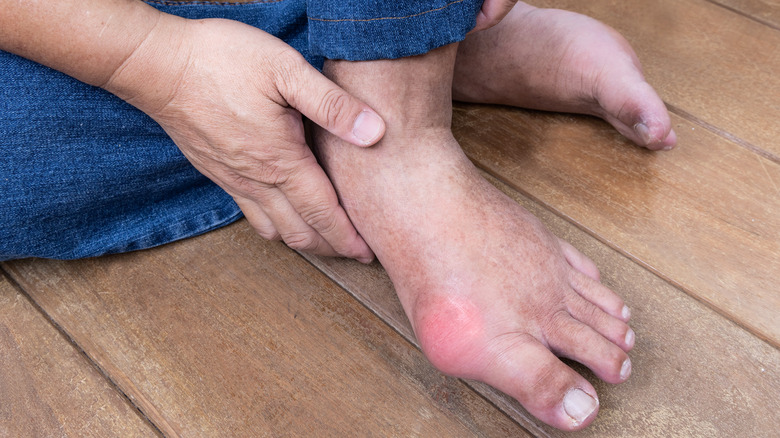Research Finds Gout Flare-Ups Could Put You At A Greater Risk For Heart Attack Or Stroke
Up to 4% of the population is estimated to have the inflammatory condition known as gout, according to 2020 research published in Seminars in Arthritis and Rheumatism. The U.S. Centers for Disease Control and Prevention (CDC) states that gout is a painful type of arthritis that is usually isolated to one singular joint. Commonly observed in the big toe, ankle, or knee, gout flare-ups come on abruptly and can last for up to weeks at a time. Those with the condition may then go anywhere from weeks to years without experiencing another flare-up.
Characterized by excessive pain, redness, swelling, and heat, the condition occurs when there's a buildup of uric acid in the body, explains the CDC. This buildup can then go on to form crystals within the joints and tissues. Consuming alcohol, fructose, and food items such as red meat, tuna, sardines, anchovies, and scallops can increase one's chances of developing gout.
Now, a new study published in the JAMA Network has found a potential link between gout and the risk of cardiovascular events, such as stroke or heart attack.
How to decrease your risk of gout
As outlined in the study, researchers compiled electronic health data from more than 62,500 gout patients dated between 1997 and 2020. A total of 10,475 gout patients with a mean age of 76 were discovered to have experienced a cardiac event following their diagnosis, compared to 52,099 patients who had not.
Dr. Abhishek Abhishek, lead author of the study, discussed the researchers' findings in a public statement. "The results show that among patients with gout, patients who experienced a heart attack or stroke had significantly increased odds of a gout flare during the preceding 120 days compared with patients who did not experience such events," said Dr. Abhishek via Healthline. Such findings indicate that gout flare-ups may increase one's risk for a subsequent cardiac event in the coming months. As a result, the study team is encouraging long-term treatment options for those with chronic cases of gout.
Although there is no cure for the condition, gout symptoms can be managed through the use of certain medications. They break up crystal formations, lower levels of uric acid in the body, and reduce inflammation (via Healthline). To help reduce one's chances of developing gout, the CDC recommends maintaining a healthy diet and engaging in 150 minutes of exercise on a weekly basis. Just remember to pick activities that don't put too much strain on the joints, such as walking or swimming.


